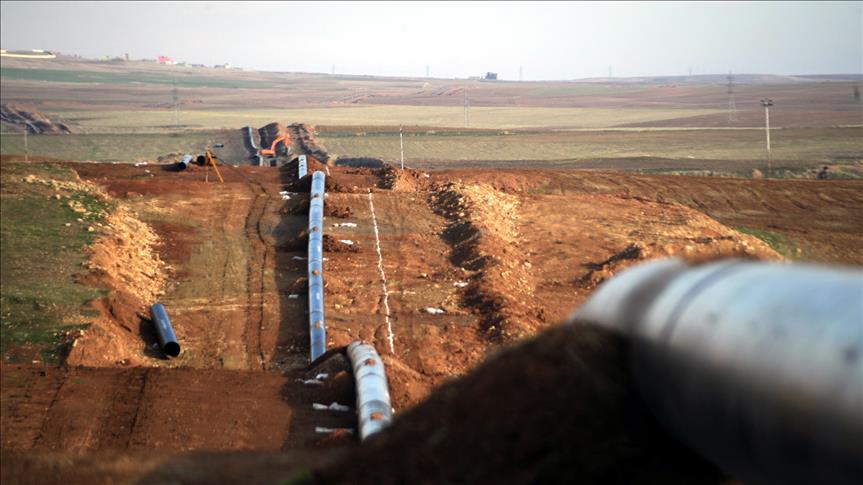Oil flow through the Iraq-Türkiye pipeline is closer to resuming after Oil Minister Hayyan Abdul-Ghani announced that crude exports via the Ceyhan Port would restart through Iraq’s State Organization for Marketing of Oil (SOMO).
Speaking on February 28, Abdul-Ghani stated that exports via Ceyhan would begin at an initial rate of 185,000 barrels per day (bpd) and gradually increase until reaching the capacity outlined in the federal budget.
The development comes nearly two years after crude flows were halted on March 25, 2023, due to disputes between the federal government in Baghdad and the Iraqi Kurdistan Regional Government (KRG).
– Agreement process with KRG
On February 2, Iraq’s parliament approved amendments to the budget law to subsidize production costs for international oil companies operating in Iraq’s Kurdistan Region, setting the transportation cost for crude at $16 per barrel.
This move was seen as a critical step toward resuming exports to Türkiye.
Shortly after, on February 4, Abdul-Ghani announced that crude from the region would be handed over to SOMO, with necessary procedures being coordinated with Türkiye to facilitate exports through Ceyhan.
On February 17, the oil minister stated that exports would resume within a week, while KRG’s acting Minister of Natural Resources Kamal Mohammed stated that the process could be completed by March.
Iraq’s Oil Ministry confirmed on February 22 that all procedures for restarting exports had been finalized.
A day later, on February 23, the KRG government announced it had reached an agreement with Baghdad to restart oil exports, with a joint technical team set up to inspect the pipeline.
By February 25, Abdul-Ghani confirmed that the pipeline was ready for exports and shipments were expected to begin within two days.
Abdul-Ghani noted that the budgeted export volume for Kurdish crude was set at 300,000 to 325,000 bpd, with a portion allocated for domestic consumption and the remainder designated for export.
– Project receives US and Russia support
On February 26, during a phone call, US Secretary of State Marco Rubio and Iraqi Prime Minister Mohammed Shia’ al-Sudani agreed to accelerate efforts to reopen the Iraq-Türkiye pipeline.
President of the KRG Nechirvan Barzani also expressed optimism on the same day, stating that crude exports via Ceyhan Port would soon resume.
Barzani identified financial arrangements with oil companies as the only remaining technical hurdle and highlighted Washington’s supportive role in the process.
He described the US as a key partner for both Iraq and the KRG and noted that American and Russian energy firms were actively engaged in the talks.
– $20 billion in lost revenues
The halt in oil exports from Iraq to Türkiye due to disputes between Baghdad and Erbil has resulted in an estimated $20 billion in lost revenue.
In August 2023, Masrour Barzani, the prime minister of KRG, had announced on X that during a meeting in Erbil with Turkish Energy and Natural Resources Minister Alparslan Bayraktar, they had reached a consensus on the importance of resuming oil exports via Ceyhan Port.
Bayraktar later stated in April 2024 that Türkiye bore no responsibility for the delays in the Iraq-Türkiye pipeline, emphasizing that the pipeline had been operational since October 4, 2023. However, ongoing disputes between Baghdad and Erbil had stalled progress.
Resuming oil flow to Türkiye is expected to strengthen ties between Ankara and Baghdad.
– Trump administration influences move to resume exports
‘Foreign companies operating in the Iraq’s KRG region have not been involved in the discussions and they might be reluctant to transfer their crude to SOMO,’ Kate Dourian, a non-resident fellow at the Arab Gulf States Institute in Washington, told Anadolu.
Dourian emphasized that in this scenario, Baghdad’s only option would be to export its own crude from the Kirkuk fields and the Khurmala field, operated by Kar Group.
‘The technical condition of the pipeline, which has been out of operation for nearly two years, remains another uncertainty,’ Dourian said.
She stated that she believes the decision to restart oil exports was made in response to pressure from US President Donald Trump.
She explained that the Washington administration had previously insisted that oil exports from northern Iraq must continue, otherwise, the country could face US sanctions as part of the ‘maximum pressure’ policy against Iran.
‘If exports do resume, they wouldn’t have much impact on global supply balances because Iraq will have to cut production from southern fields under federal control in order to meet its OPEC+ quota,’ Dourian concluded.

